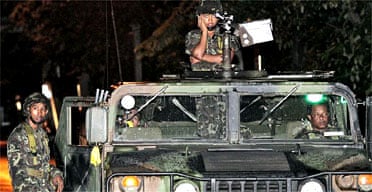The Thai military today launched a coup against the prime minister, Thaksin Shinawatra, sending tanks onto the streets of Bangkok before declaring martial law and announcing it had formed an interim regime.
A statement read out on national television from the army commander in chief, Lieutenant General Sonthi Boonyaratglin, said martial law had been declared across Thailand. The army chief ordered all troops to report to their duty stations and not leave without permission from their commanders.
The Thai constitution was also being revoked, he said, while assuring the public that the seizure of power was temporary and government would be "returned to the people" soon.
"The government is no longer administering the country," army spokesman Col Akara Chitroj told reporters in Bangkok.
Mr Thaksin - who is in New York for the UN general assembly - "will not return to Thailand for the time being," he added, without elaborating.
The prime minister had responded to the first coup reports by declaring a state of emergency and dismissing Lt General Sonthi.
However, an announcement soon afterwards on national television said military forces loyal to the country's King Bhumibol Adulyadej had taken control of Bangkok and nearby provinces, meeting no resistance. The group, naming itself as the Council of Political Reform, said it was led by the head of the national police as well as Lt Gen Boonyaratglin.
"In the interest of maintaining law and order, a request is therefore made for public cooperation for which our apologies for any inconvenience," the statement added.
The announcement said the council would be headed by the King as the head of state, although there was no indication that the much-revered monarch - who rarely comments on or intervenes in politics - had any role in the coup, the first in Thailand for 15 years.
According to the coup leaders, it was launched because Mr Thaksin's government had divided the country and corruption was rampant.
The prime minister tonight cancelled his scheduled address to the UN meeting in New York.
Earlier this year, Mr Thaksin, a multi-millionaire telecoms tycoon who first took power in 2001, faced mass demonstrations over alleged corruption and tax avoidance by his family.
Coup rumours began after Thailand's army-run television suspended broadcasts and began playing songs praising King Bhumibol Adulyadej, the Guardian's south-east Asia correspondent, John Aglionby, said
Tanks took to the streets of the capital, Bangkok, blocking streets and surrounding the prime minister's office and other government buildings. Witnesses then said the prime minister's office had been seized by troops.
A convoy of four tanks, rigged with loudspeakers and sirens, rolled through a busy commercial district of Bangkok, broadcasting messages warning people to get off the streets for their own safety.
In a voice-only broadcast from New York, Mr Thaksin said: "The prime minister, with the approval of the cabinet, declares serious emergency law in Bangkok from now on."
A senior Thai official in New York was quoted by the AFP news agency as saying Mr Thaksin was "calm" and still considered himself prime minister of Thailand.
Initial international reaction was muted with the foreign office saying only it was monitoring the situation. A US state department spokesman called on Thais to "resolve their political differences in a peaceful manner and in accord with the principles of democracy and the rule of law".
Mr Thaksin, who was re-elected in 2005, faced protests earlier this year connected to relatives' sale of their controlling stake in Shin Corp, the telecoms empire he founded.
He held and won a snap election in April, but the poll was boycotted by opposition parties. It was followed by political deadlock, which ended only when the King called on politicians to resolve their differences.
In April, the prime minister handed day to day power to his deputy, Chidchai Vanasatidya, but took it back the following month, saying it was time to get back to work on security and economic issues. New general elections are scheduled for October.
Thailand has experienced 17 military coups since 1932, when the then absolute monarchy was deposed. The last coup happened in 1991.
